I have a lot of CDialogEx derived classes that do something like this in OnInitDialog:
CMeetingScheduleAssistantApp::InitialiseResizeIcon(m_bmpResize, m_lblResize, this);
CMeetingScheduleAssistantApp::RestoreWindowPosition(_T("PublisherDB"), this, true);
Then, I have the following added to each derived dialog class:
int CPublishersDatabaseDlg::OnCreate(LPCREATESTRUCT lpCreateStruct)
{
if (CDialogEx::OnCreate(lpCreateStruct) == -1)
return -1;
// Save Initial window size to m_rcInit
GetWindowRect(&m_rcInit);
return 0;
}
void CPublishersDatabaseDlg::OnGetMinMaxInfo(MINMAXINFO* lpMMI)
{
// Set the minimum window size to initial size.
lpMMI->ptMinTrackSize.x = m_rcInit.Width();
lpMMI->ptMinTrackSize.y = m_rcInit.Height();
CDialogEx::OnGetMinMaxInfo(lpMMI);
}
void CPublishersDatabaseDlg::OnClose()
{
CMeetingScheduleAssistantApp::SaveWindowPosition(_T("PublisherDB"), this);
CDialogEx::OnClose();
}
The only thing that is different for each dialog is the phrase that is used for saving the window position.
I want to have a based CDialogEx class that I can inherit from that will perform the above actions. I have looked on SO and seem some questions and creating a CDialog class and inheriting from another CDialog class. But this class I want to create is more generic. Effectively to be used as a base instead of CDialogEx.
Can this be done? Am I over-complicating this?
Problems
Why I try to create a new class, derived from CDialogEx:
I don't know if it is because it requires a dialog ID as stated here.
Classes such as
CDialog,CFormView, orCPropertyPage, which require a dialog ID.
So I can't work out the correct way to create a base CDialogEx class for use in all my other dialog classes.
Update
I created this code and it tells me that CResizingDialog is not a class or a namespace:
#include "ResizingDialog.h"
#include "resource.h"
#include "stdafx.h"
IMPLEMENT_DYNAMIC(CResizingDialog, CDialogEx)
CResizingDialog::CResizingDialog(const CString& strWindowID, UINT nIDTemplate, CWnd* pParent = nullptr)
: m_strWindowID(strWindowID), CDialogEx(nIDTemplate, pParent)
{
}
CResizingDialog::~CResizingDialog()
{
}
void CResizingDialog::DoDataExchange(CDataExchange* pDX)
{
CDialogEx::DoDataExchange(pDX);
}
BEGIN_MESSAGE_MAP(CResizingDialog, CDialogEx)
ON_WM_CREATE()
ON_WM_GETMINMAXINFO()
ON_WM_CLOSE()
END_MESSAGE_MAP()
int CResizingDialog::OnCreate(LPCREATESTRUCT lpCreateStruct)
{
if (CDialogEx::OnCreate(lpCreateStruct) == -1)
return -1;
// Save Initial window size to m_rcInit
GetWindowRect(&m_rcInit);
return 0;
}
void CResizingDialog::OnGetMinMaxInfo(MINMAXINFO* lpMMI)
{
// Set the minimum window size to initial size.
lpMMI->ptMinTrackSize.x = m_rcInit.Width();
lpMMI->ptMinTrackSize.y = m_rcInit.Height();
CDialogEx::OnGetMinMaxInfo(lpMMI);
}
void CResizingDialog::OnClose()
{
SaveWindowPosition(m_strWindowID, this);
CDialogEx::OnClose();
}


